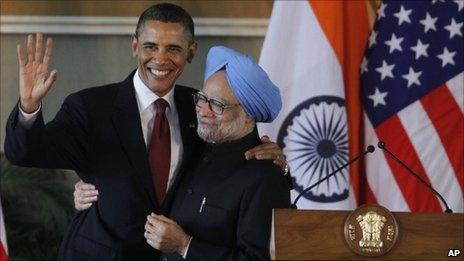Obama confirms US strategic shift towards India
- Published

The two leaders emphasised US-India ties, saying relations between the two countries would be one of the century's defining partnerships
President Barack Obama's support for India to have a permanent seat on the UN Security Council is a major foreign policy statement by the United States.
Building on President George W Bush's acceptance of India as a nuclear power, it is the culmination of a process that has seen the US move away from the suspicion of India during the Cold War to the concept of the US and India being strategic and, as Mr Obama put it, "defining" partners.
India, he asserted, was an "emerged" power.
It is a mark of how much Pakistan has slipped down the list of American friends in the region.
The US still needs Pakistan but its support for Pakistan no longer means antagonism towards India.
Kashmir - engine of extremism?
As with other visitors who have paid their respects to the growth of Indian influence - such as UK Prime Minister David Cameron - Mr Obama notably avoided any criticism of India over Kashmir.
This disputed state, divided between Pakistan and India, is seen by some experts as one of the engines of extremism in Pakistan.
The president did call for dialogue between India and Pakistan (without mentioning Kashmir as an issue) but added what were for India the magic words that only the two countries involved could solve their problems.
That means no outsiders need apply, and no pressure on India.
The Security Council endorsement is also a signal to China that the United States has other interests in Asia beyond resolving its economic differences with Beijing.
The American relationship with China is going through a troubled patch because of the huge trade deficit and the long-term outcome is uncertain.
In the meantime, Washington is lining up supporters. India, too, will be looking for US support in any outbreak of its border problems with China.
Power shift
This is also a signal to the rest of the world that global power is shifting and that America recognises this.
It is a splash of cold water for the Europeans, whose two veto-holding powers Britain and France would lose in an expansion of the Security Council, even if only by an extension of the veto to others.
India's chances of achieving its ambition for a permanent seat have certainly received a boost but the equation is a complex one and the solution not immediately clear.
If India is to get a seat, then Germany, Japan and Brazil will expect one as well.
Getting agreement for all four means that opposition from their opponents would have to be overcome.
There have been several attempts at reform over the years but nothing has happened: the default position is the status quo.
US economic weakness
China has indicated that it might not be against an Indian seat, but would it want Japan? Would Pakistan and South Korea?
Would other Latin American countries agree on Brazil? Would the US accept a third European power (Germany) on the Council?
The permutations are almost insuperable.
Therefore India cannot look for a quick fix following this now open American support.
There is a footnote as well. It is that Mr Obama, whose party has just suffered defeats in the mid-term congressional elections, is not only a benefactor but a supplicant.
He is keen to get India to open up to US trade and is loosening restrictions on Indian companies that were penalised because of past differences over nuclear policy.
These days, the US economy needs all the help it can get.
- Published5 November 2010
- Published4 November 2010